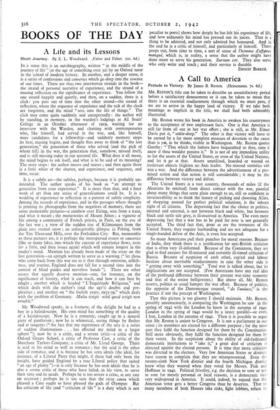A Life and its Lessons
BOOKS OF THE DAY
Short Journey. By E. L. Woodward. Faber and Faber. nos. 6d.) IN a sense this is an autobiography, written " in the middle of the journey of life " (at the age of something over 5o) by an Oxford tutor in the school of modern history. In another, and a deeper sense, it
is a series of confessions and causeries which go deep into the essence of our times. There are thus two interwoven strands in the book—
the strand of personal narrative of experience, and the strand of a musing reflection on the significance of experience. You follow the one strand happily and quietly, and then, on a sudden, there is a
click : you pass out of time into the other strand—the strand of reflection, where the sequence of experience and the tick of the clock are forgotten, and the mind " sees into the life of things." The click may come quite suddenly and unexpectedly : the author will be standing, in memory, in the warden's lodgings at All Souls' College in an October afternoon' of 1919, waiting for an interview with the Warden, and chatting with contemporaries who, like himself, had served in the war, and, like himself, were candidates for a fellowship—and suddenly memory stops its beat, musing begins, and thought flies away to think of " the lost generation," the generation of those who served (and the pick of whom fell) in the war, the generation that, somehow, missed itself, and is still missing today in our national life. What does it all mean, the mind begins to ask itself, and what is -to be said of its meaning? The story stops: the author muses and muses ; and then again there is a little whirr of the shutter, and experience, and sequence, and time, recur.
It is a subtle art—the subtler, perhaps, because it is probably un- intended. The author speaks of his book as " an attempt to generalise from your experience." It is more than that, and a finer work of art than any series of generalisations could be. It is a wedding of experience to reflection in a pattern of subtle simplicity. Among the records of experience, and in the passages where thought is printing its photographs from the negatives of memory, there are some memorable pictures—a rainbow over Ealing, seen from a train, and what it meant ; the monasteries of Mount Athos ; a vignette of life among a community of French priests, in Paris, on the eve of the last war ; a view of the sudden rise of Kilimanjaro from the plain into eternal snow ; an unforgettable glimpse in Peking, from the Ten Thousand Hills, over the Forbidden City. But, memorable as these pictures are, it is perhaps the interspersed essays or causeries (like so many lakes, into which the current of experience flows, rests for a little, and then issues again) which will remain longest in the reader's mind. Mention has already been made of the essay on the lost generation—an epitaph written to serve as a warning (" let those who come back from this war see to it that through omission, selfish- ness, and routine, England does not fall for a second time into the control of blind guides and nerveless hands "). There are other essays that equally deserve mention—one, for instance, on the significance of history, what it can teach, and how it can best be taught ' • another which is headed " L'Inquietude Religieux," and which deals with the author's (and the age's) doubts and per- plexities ; and another on " the foolish years, 1933-39," which deals with the problem of Germany. Multa tetigit: nihil quad tetigit non ornabit."
Mr. Woodward speaks, in a footnote, of the delight he had as a boy in a kaleidoscope. His own mind has something of the quality of a kaleidoscope. Now he is a romantic, caught up in a natural piety of pantheism ; now he is whimsical, seeing things by flashes and at tangents (" the fact that my experience of the arts is a series of sudden illuminations . . . has affected my mind in a larger sphere "); now he is a critic, and a severe critic—a critic of the Oxford Greats School, a critic of Professor Cast, a critic of the Merchant Taylors Company, a critic of Mr. Lloyd George. There is acid in his mind as well as romance ; but the acid is the other side of romance, and it is because he has seen ideals (the ideal, for instance, of a Liberal Party that might, if there had only been the insight, have guided England by a true Liberal policy that suited " an age of plenty ")—it is only because he has seen ideals that he is also a severe critic of those who have failed, in his view, to serve their time and its needs. Perhaps he is too severe a critic, at any rate on occasion ; perhaps he is too sure that the victa causa which pleased a Cato ought to have pleased the gods of Olympus But his criticism of life (and " criticism of life ' is a duty which is not peculiar to poets) shows how deeply he has felt his experience of life, and how arduously his mind has pressed out its juices. That is a thing to be admired, and not only admired but honoured. And in the end he is a critic of himself, and particularly of himself. There peeps out, from time to time, a sort of sense of l'homme d'affaires manqué, which is, in reality, a sense that the author might have done more to serve his generation. Sursum car. They also serve who only write and teach ; and their service is durable.
ERNEST BARKER.
•


























 Previous page
Previous page